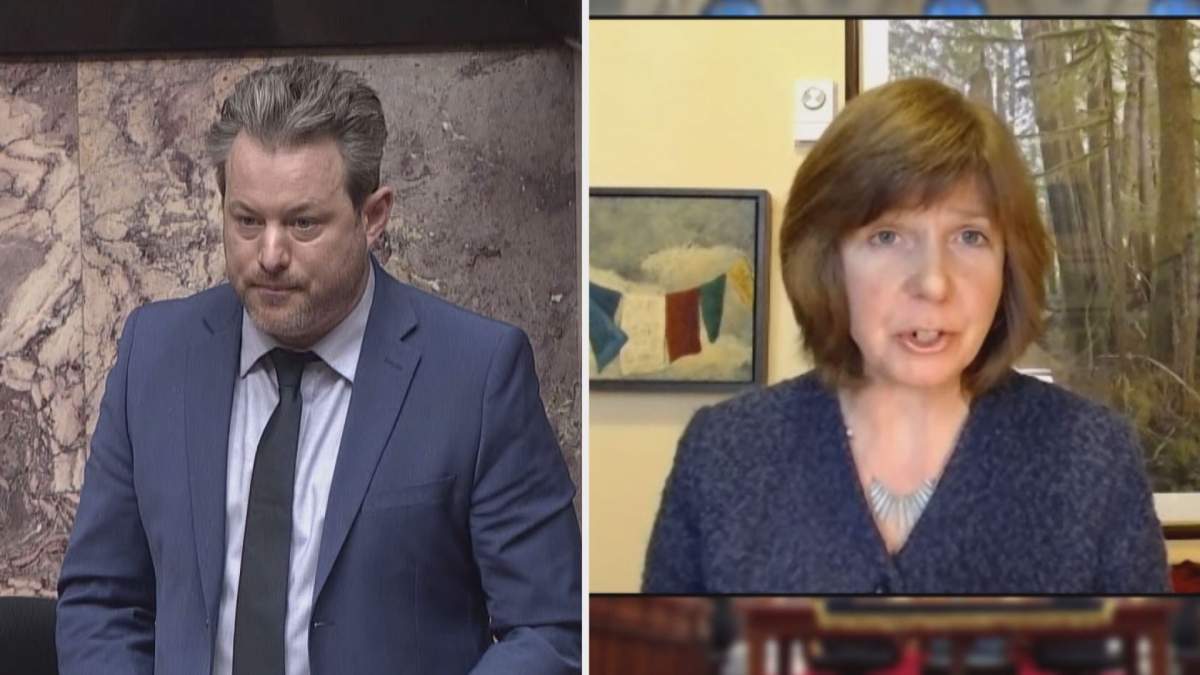B.C.’s minister of mental health and addictions defended Interior Health‘s controversial decision to pull funding for an addictions resource centre in Penticton, B.C., when pressed by the opposition during question period in the B.C. legislature on Monday.

Sheila Malcolmson said that bringing substance-use counselling services in-house will be beneficial to clients.
“When the existing external contract ends on May 31, Interior Health assures us there will be no disruption in continuity of care for people that need it,” she said.
“We are adding more and more services for people to be able to overcome stigma, have services that meet them where they are at. This is an unprecedented expansion in access to addictions treatment support.”
Malcolmson suggested the provincial government is not involved in health authority decision-making when it comes to contracts and services.
“Interior Health, as all the health authorities are, are making their own decisions about addictions, mental health and health delivery. They start and stop contracts all the time,” the minister said.
Trevor Halford, official opposition critic for mental health and addictions, was quick to pounce on the statement.
“We just heard the minister say, ‘it is not my responsibility, it is somebody else’s.’ So again my question is to the premier, will he step in and restore the funding to the treatment centre?”

Pathways Addictions Resource Centre has been a cornerstone in the Okanagan city for 47 years and its operated with funding from Interior Health for the past two decades.
Five counsellors support 1,000 clients per year with their drug and alcohol addiction challenges.

Get breaking National news
On March 2, the resource centre announced Interior Health will cancel its contracts as of May 31 to bring all substance-use counselling services in-house to establish a single point of access.
Interior Health currently provides $500,000 in annual funding. Without financial support, Pathways said it may not survive.
A protest was held outside the Pathways building on Sunday, as family members of past and present clients rallied to save the beloved resource centre.
Supporters credit the centre for saving lives. Some are worried about possible waitlists and that the absence of a drop-in centre could create barriers to accessing services when Interior Health steps in.

Malcolmson rattled off a list on Monday of recent mental health and addictions investments in the B.C. interior, including additional youth treatment beds, new integrated treatment teams, and the launch of Interior Health’s six Urgent and Primary Care Centre, which is scheduled to open in Penticton at the end of March.

Karin Kirkpatrick, MLA for West Vancouver-Capilano and official opposition critic for children, family development, and childcare, also pressed the BC NDP on defunding the addictions counselling centre.
“Why is the premier taking away a trusted local treatment option, closing this treatment centre and reducing services to those in need?” she asked.
“Frankly, it’s dangerous for the opposition to suggest that there are not treatment options for people,” Malcolmson responded.
“There are… more options for addiction’s treatment and support and recovery than there has ever been before,” she said.
Dan Ashton, Liberal MLA representing Penticton, expressed disappointment with the minister’s comments following question period.
“Far too many unanswered questions remain,” Ashton tweeted. “There is a critically important service in our community that this NDP government is allowing to be dismantled without a clear plan from Interior Health, he said.
“Our community deserves answers.”








Comments